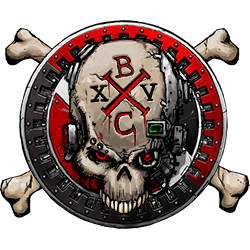Search the Community
Showing results for tags 'event support'.
-
In the past, the Bolter & Chainsword was represented by members at a number of events, running club tables. I ran Arena of Death tables at several Games Days, for example, and really enjoyed meeting fellow hobbyists and members of the site each time. One day, Nurgle willing, the world might be able to have conventions again. When that glorious day happens, I'd like for the site to be able to support members of the community being able to run club tables. We likely won't be able to provide material support, but we can probably offer ideas for club tables, advice on running club tables, and even files that members might download for the creation of banners, business cards, posters, and the like. To that end, I'm soliciting input for several things: Ideas for tables, complete with rules and aids to run each Advice for running a club table Thoughts from those that have played club tables in the past (as convention attendees) Running club tables isn't easy, and a major factor in whether or not it's enjoyable for the person running the table is whether or not they are interested in the faction(s) and the game. Ideally, we'll be able to develop a number of club table ideas, giving players a range of options so that there is a higher likelihood of them being interested in one of them. For example, if member A is interested in running a table but is only interested in the Drukhari, they're much more likely to actually run a table if we have something that features the Drukhari. Similarly, fans of Aeronautica Imperialis are more likely to run a table for that game than for a game that they're not interested in. This also saves people money as they're more likely to have the models and materials necessary to play the game. We wouldn't necessarily need to cover every possible interest focus, and some flexibility in each option also helps. For example, I'm developing the Hive of the Dead scenario that the mods started working on in 2010. It features a lone Space Marine Scout trying to survive a hive infested with Plague Zombies. It would be easy to substitute for the Scout, though, replacing him with an Enforcer (for fans of Necromunda), a Tempestus Scion or Astra Militarum Veteran, or a battle sister of the Adepta Sororitas. For those of you that have run club tables in the past, whether for Games Workshop games or other tabletop miniature wargames (including historical games), what advice would you give for other members that might be considering running their own table? For my own part, there are three main things that I took away: SIMPLE The experience level of convention attendees varies, and some are brand new to the hobby. The goal of club tables is to give them something fun and easy to do without having to learn a lot of new stuff. The people running the table should be able to serve as the primary rules reference, keeping everything easy and fair for the attendees. There are ways to build in options that more experienced attendees can use, but the basic table should be simple enough for everyone. SHORT Convention attendees don't want to spend an hour of their time at a single table (usually). Club table experiences should be short and sweet, allowing participants to have fun and move on (and allowing more participants to enjoy the table). Sometimes, participants will come back if they really enjoy the table, and there are ways to give them longer gaming experiences if the setting allows. When you go to a boardgame convention and sit down to play Twilight Imperium, you're expecting a long-haul experience. When you go to a roleplaying convention, you similarly expect a session to last a long time. At tabletop miniature wargame conventions, however, people are often looking for something short and sweet. There is certainly room for big gaming experiences such as GW's Battle of Kalevala (in which the Steel Confessors defended their planet from a Tyranid hive fleet) or when you play the Battle of Waterloo at a historical convention. Most of the time, however, GW games can be reduced from the normal hour (or more) experience to something shorter. Not all such tables need to be short - we can include a big game here and there - but most should be 30 minutes or less. PROVIDE EVERYTHING While some convention attendees bring stuff to play, many bring very little or nothing at all. A club table should provide everything that a player needs to play the game. Everything should be painted to a battle ready level. Rules should be readily available (preferably on a single sheet of paper). Dice, measuring devices, templates, and tokens/markers should be handy. The table should support a casual convention attendee walking up with nothing at all. The exception to this is that there are times when a club table might require something special. Typically, this will be when participation at a table is pre-arranged and prospective participants have the time to prepare whatever is necessary. For example, someone might develop an event for a local game store, challenging members to convert a special character for a tournament of duels against other players' characters. Or an event might feature squad level warband action such as Kill Team or Necromunda, challenging players to pit their force against some special gribblies that you provide (e.g., can your gang survive a run to safety through a horde of zombies?). In general, consenting to run a club table means agreeing to a lot of logistical support and a lot of time and effort - all to make the convention attendee's experience as positive as possible. Conversely, for those of you that have played at club tables in the past, what were the things you liked? What didn't you like? What do you think would be fun? The goal of club tables, after all, is to help attendees have fun. Typically, convention attendees aren't just looking for the same old same old. While a typical Kill Team game table might be nice (and perfectly acceptable), convention attendees really remember the things that are different. Small twists here and there make an otherwise standard table into something memorable. The Arena of Death tables are a good example. We developed some fairly simple rules and provided a battleground and nicely painted models. The main weakness with the tables was when I procrastinated and didn't have the tables quite as sexy as I would have liked. However, each character had a small rules card with their image and everything a player needed to know to play the character. Games usually lasted no more than 15 minutes. We even had some options for when players wanted to change things up, such as a deathmatch map complete with exploding barrels. Similarly, the table I'm working on now features a lone Scout moving through a zombie-infested hive. The packet will include tokens that players can print and cut out, so they won't have to spend money and time painting up a horde of zombies (though they are certainly encouraged to do so if they have the gumption). Similarly, we've adjusted our original idea to the current materials, replacing our old map with an official battlezone. The only miniature you need to paint is a lone Scout (though I recommend four Scouts to cover options in the rulebook). You'll need to provide the terrain and dice, too, but everything else is provided for downloading/printing. All of the above is, of course, my own opinion. We're certain to develop a much better overall picture with input from more people. Ultimately, I'd like to develop a B&C guide to club tables and a library of club table packets that players might use in their own club tables. And if you want to run a club table as a representative of the B&C, we'll provide some files that you can use to make your own signs, posters, and even business cards, pamphlets, or advertisement cards. You'll have to get them printed yourself because we don't have a budget to speak of.
- 3 replies
-
- club table
- convention
-
(and 1 more)
Tagged with:


